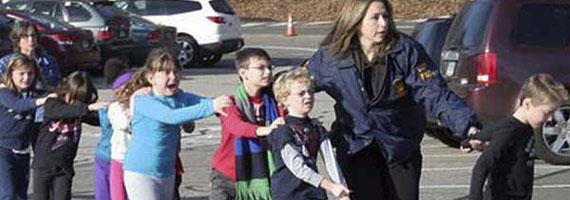At 1:00 p.m. last Friday I was at the gym running on the treadmill. I switched my television to Fox News. A minute later I got off the treadmill. I couldn’t breathe. I fought back tears. Over 20 people killed by a masked gunman at Sandy Hook Elementary School in Connecticut. Most of the victims were children, kindergarten students, practically babies. I still don’t understand.
As I watched the details of this horrific tragedy unfold over the new few hours, my mind raced with questions. How could this happen? How will the families of the victims get past this? Is it selfish to be thankful it wasn’t my children in that school? How do you explain this to the children who survived, who saw things no child should have to see? And the question that hits home for most parents across the country, how do I explain this to my own children?
This isn’t the first time I’ve asked myself this question. In fact, my overwhelming desire to shelter my children from the tragedies of the world is the main reason I refuse to watch the news in front of them. I need them to hold onto their purity.
But that’s impossible. At some point, our kids discover that our world is filled with tragedy. Like a 20-year-old entering a school and gunning down innocent people. Like deadly natural disasters. Like flag-draped coffins. And they’re going to want to know why. They’re going to have questions I won’t have answers to.
As a parent, I feel at a complete loss. If I can’t explain tragedies like this school shooting to myself, how am I supposed to explain it to my children? Should I wait until my children ask me questions or should I broach the subject before they hear about it at school or from friends? How can I communicate with my children without scaring them or causing them to question their own safety?
So what is a parent supposed to do? Here are 6 tips for talking to your children about tragedy:
1. Consider your child’s age and maturity level. My daughter is 5, and I know she’s not capable of processing the details of an event as tragic as this school shooting. My son is 8, and although I feel he’s on the cusp of an emotional intelligence that can handle more detailed discussions than his sister, I still stuck with information that was honest, yet as simple as possible. Don’t go into more detail than your child wants or needs to know.
2. Limit media exposure. Watching several hours of news coverage on Friday left me feeling overwhelmed, heartsick and emotionally spent. And I’m an adult. Can you imagine how hours of media exposure would affect your child? Information should be coming from you as a parent, not from reporters. Plus, young children tend to believe the replaying of footage means the event is reoccurring, which is even more distressing. The news is geared toward us adults, not children.
3. Don’t avoid it. My initial response was to avoid telling my kids what had happened in Connecticut. But it’s plastered all over the news. My son can read. He can use the Internet. He can turn on the television. If he doesn’t hear it from me, he’s going to hear about it somewhere else. I need to be his source of information, not one of his 3rd grade classmates. Not talking about it isn’t going to help. In fact, if your child already knows about it and notices you haven’t brought it up, it might make him feel it isn’t an acceptable subject to discuss.
4. Encourage questions. My son is the kind of kid who bottles up his emotions. He also often needs a little time to wrap his head around new information. I frequently find myself encouraging him to ask questions because I don’t think he’ll ask them on his own. Let your children know that they can come to you with questions at any time and you’ll answer them truthfully, even if an honest answer is "I don't know."
5. Validate feelings. Everyone reacts to tragedy differently. Remind your children that whatever they’re feeling is normal. Share how the event made you feel and help them verbalize their feelings.
6. Reassure them of their safety. Oftentimes, when tragedy strikes, children wonder, “Can that happen to me?” Explain that just because the event happened in one place, it doesn’t mean it’s going to happen to them. In the case of the school shooting, reiterate that it was a rare, isolated event and they are still safe in their own school.
And then, at the end of the day, do what I did as soon as I saw my kids on Friday afternoon: pull them close, hold them tight and tell them how much you love them.
How do you explain tragedies like the Connecticut school shooting - or any tragedy, including military deaths -- to your children?









